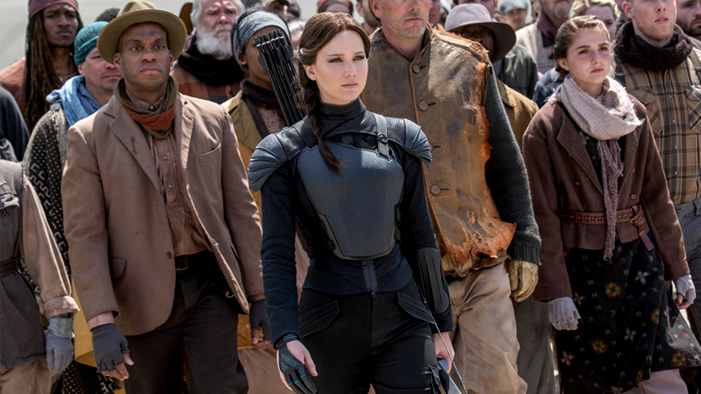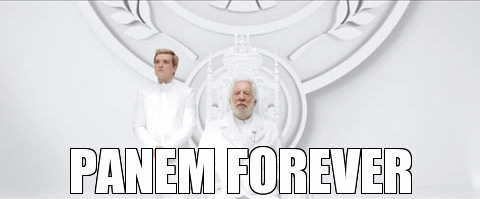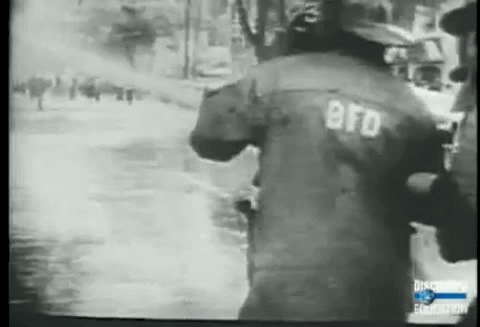Suzanne Collins Knows What’s What with Civil Rights; Look at What Mockingjay Can Teach Us About Racism Today

This post was originally published in 2014, but its message will always be relevant.—Sparkitors
You probably know the phrase, “Panem today, Panem tomorrow, Panem forever.”

Peeta’s face: “… forever is going to su-hu-huck.”
BECAUSE YOU ARE SMART, you already know that Panem derives from the Latin panem et circenses—“bread and circuses,” trivialities doled out by the government to distract citizens from the real politics of the state. (The Hunger Games: If Cirque du Soleil was taken over by sadists.)
But the syntax harkens back to something a BIT MORE RECENT, at least according to my best guess—the pronouncement of racist old coot/former Alabama governor George Wallace in his 1963 inauguration: “Segregation now, segregation tomorrow, segregation forever.”
*All of Alabama slaps heads in unison*
Suzanne Collins was unquestionably interested in class politics when she wrote The Hunger Games series, but she was also keenly aware of racial injustice right here in the U.S. That’s why we weren’t surprised to see young activists invoking Mockingjay in recent protests over police treatment of young black men.
In fact, I see some similarities in the filming of certain scenes of civil unrest in Mockingjay and infamous moments from the civil rights movement, like this footage of police turning fire hoses on black protestors in Birmingham in ’63 (note the muttations at end):
Compare it to this shot of Panem rebels rushing Peacekeepers at the dam:

Powerful stuff, right?
The pivotal moment for Katniss in The Hunger Games is the death of Rue, a young black girl from District 11, Panem’s agricultural center and an easy stand-in for the old South. Katniss’s humanitarian response becomes the first instance of inter-district empathy, and sets her on her way to becoming the emblem of resistance. Rue’s death seems to reference, at least in a small way, the death of four black girls in a 1963 Ku Klux Klan church bombing in Birmingham that sparked intensified civil rights protests and eventually made way for the Civil Rights Act of 1964 (they were the subject of Spike Lee’s 4 Little Girls documentary).
It took the deaths of four children at Sunday school, as well as a charismatic leader, Martin Luther King, Jr., to shock enough people into believing that while slavery was long gone, racism persisted in America. Yet today, much of the country isn’t convinced that the continuous slaying of unarmed/innocent black men by police has a racial underpinning.
Many of your millennial peers (68% of those surveyed by MTV) believe that “focusing on race prevents society from becoming colorblind.” Seventy percent think racial preferences (affirmative action) are unfair, despite historical inequalities (which persist to this day). Forty-eight percent of white millennials surveyed believe white people face as much discrimination as their minority counterparts. Slate’s Jamelle Bouie writes:
Millennials have grown up in a world where we talk about race without racism—or don’t talk about it at all—and where “skin color” is the explanation for racial inequality, as if ghettos are ghettos because they are black, and not because they were created. As such, their views on racism—where you fight bias by denying it matters to outcomes—are muddled and confused.
So we have young people who say it cannot and should not be boiled down to racism. And we have the hundreds of thousands of people who turned up to march in Washington D.C. and New York City and other cities (including Denver middle and high school students who walked out last week) over the weekend for the civil rights of people of color, alongside the families of youths killed by police, behind banners that read #BlackLivesMatter.
Who is riding one too many pool noodles at this pool party?
The gap in attitudes over the prevalence of racial factors in police brutality (and society in general) likely comes down to two things:
1. Your generation is more tolerant of race, gender identity, sexuality and so on. Even just a few years ahead of you, I can say that NO ONE in my high school was “out,” and the minority students—who had tons of friends and weren’t “discriminated against” per se—got stuck with stupid, racist nicknames (to be fair, most of the nicknames were stupid, but there is a different between calling someone “Bort” as a Simpsons reference and calling someone “Curry” because they’re Indian). You probably haven’t experienced racism in the same way that older people have. Your world probably is more tolerant. Your world is also smaller than someone who is older: if you have lived in the same town or suburb your whole life, your experience may not exactly be representative of someone living in the Bronx, especially if you live somewhere lily white and chock full of Peets Coffee outlets and Abercombies. This is a nice way of saying you don’t necessarily know much 🙂 That’s okay—Effie didn’t really have a clue about how non-Capitol citizens lived until she got to know some kids from District 12. We are all learning all the time.
2. Some of your generation misunderstand what racism is. Racism isn’t people in pointy white hats putting burning crosses in people’s backyards, though I’ll bet that’s largely what you’ve focused on at school. Racism is so much more insidious than that. It is assuming that your viewpoint is universal/the norm. It is making unconscious assumptions about people, like “This [white] person appears to be in pain” (administers pain medicine); “this [black] person appears to be in pain” (administers a lower dose of pain medicine). It is assuming that of two identical resumes, the one with the whiter-sounding name is more qualified. It is subpar education and a lack of jobs in poor areas furthering poverty among those born into it. It is dehumanizing and demonizing a person of a different color. It is seeing someone and assuming they are dangerous, solely on account of their skin color.
What in blazes does a white person like myself know about racism? Not much, truly. I am very interested in civil rights, I am friends with many people who actually work to help disadvantaged or discriminated against people (lawyers, social workers, human rights activists etc.), and SOME OF MY BEST GRANDPARENTS ARE RACIST, but I am undoubtedly a white girl who has floated through life on the magic carpet of white privilege. Thinking myself SO AWARE and SO EDUCATED about race, I recently took Harvard’s Race Implicit Association Test. The IAT asks you to hit different keys when you see a good word (“pleasure”), a bad word (“malaise”), a European-American face and an African-American face. My results told me that I demonstrated a “moderate preference for European Americans over African Americans.” In coffee shop chat, I was biased toward white people. THAT is what racism is. A learned, subconscious bias toward members of my in-group (for those who don’t know me, my “in group” is gingers with the physique of President Josiah Bartlet).
There are more clues in The Hunger Games series of Collins’ interest in racial issues: Over at The Artery, Amelia Mason dissects “The Hanging Tree” as an echo of a slavery song, noting that Plutarch even appropriates it, changing the words a little, just as civil rights activists adapted “We Shall Overcome” from an African gospel song. Meanwhile, Haymitch’s name is borrowed from civil rights leader Ralph Abernathy. Lastly, there is the Mockingjay salute, which, viewed en masse, recalls the black power salute.
One of the most important parts of Mockingjay Part 1 is the focus on the Capitol ex-pats (Effie, Cressida, Pollux, Plutarch), some of whom had been working for the resistance for some time, and some (Effie, for example, and later on rebel sympathizer and Capitol resident Tigris) who took longer to realize the scale of the suffering outside the gilded bubble of the Dubai shopping mall that is the Capitol. The filmmakers encourage you to look at Capitol citizens and try to understand how they could have gone along with a regime so bad for so long.
From there, it is a lesser leap to ask, “Am I oblivious to prejudice and suffering in my world?” Because we all are to some extent.
SOUND OFF! Are you among the millennials that believe living in a colorblind world will eliminate racism? Do you think people of color are disadvantaged in our society? What do you think about Suzanne Collins’ invocations of the civil rights movement in The Hunger Games series—did you catch any of them?













